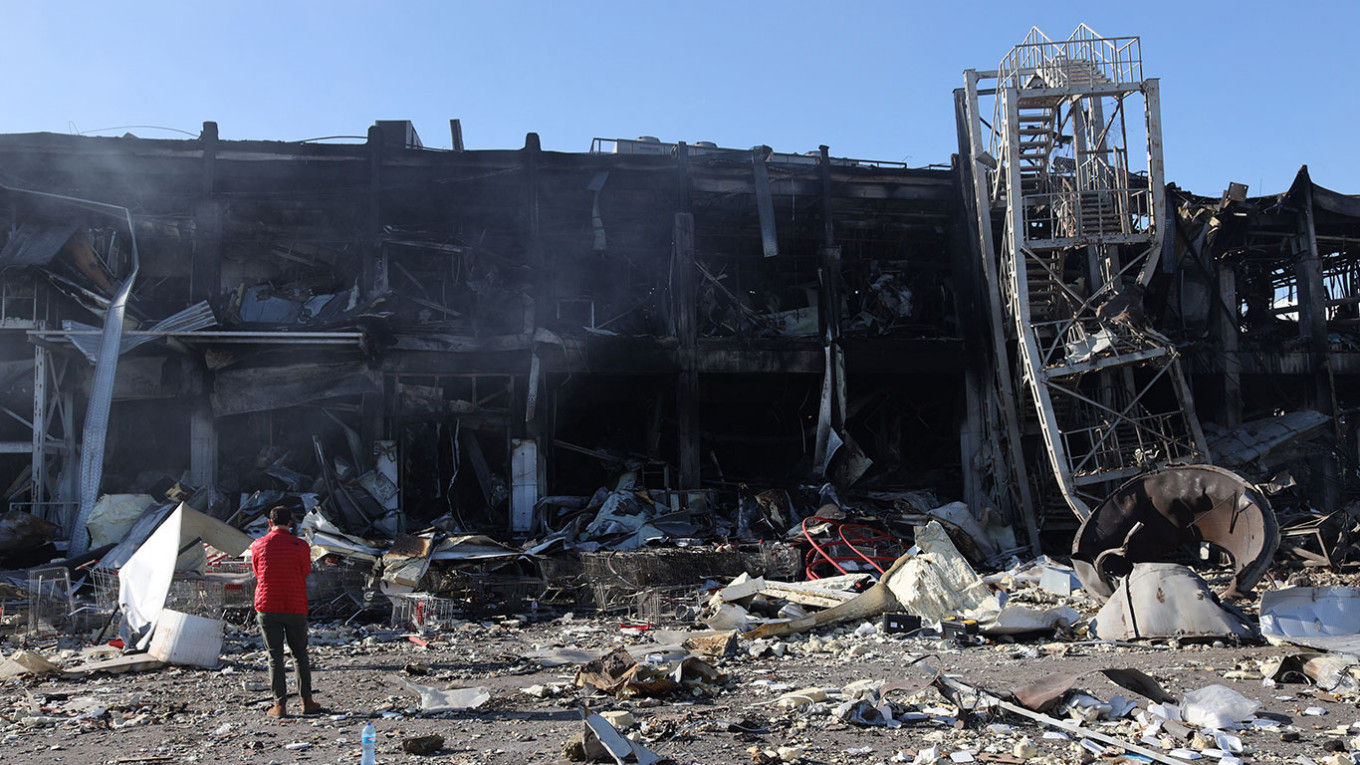
Ukraine said Wednesday it was pushing Russian troops away from the country’s second city Kharkiv but facing stiff resistance, as Washington predicted that Vladimir Putin was ready for a long war.
With President Joe Biden warning that Ukraine would within days likely run out of funds to keep fighting, the U.S. House of Representatives voted late Tuesday to send a $40 billion aid package to the country.
Russia has focused on eastern Ukraine after failing to take Kyiv. Ukraine’s forces are struggling to hold on in the Donbas region, but have been boosted by what Kyiv says is the recapture of four villages around Kharkiv further north.
President Volodymyr Zelensky said in his nightly address Tuesday that he had “good news” from Kharkiv.
“The occupiers are gradually being pushed away,” he said. “I am grateful to all our defenders who are holding the line and demonstrating truly superhuman strength to drive out the army of invaders.”
Ukraine’s general staff of the armed forces said on Facebook on Wednesday that “occupiers continue to focus their efforts on preventing the further advance of our troops towards the state border of Ukraine” from Kharkiv.
The head of the Kharkiv regional state administration Oleg Synegubov said four villages — Cherkasy Tyshky, Rusky Tyshky, Rubizhne and Bayrak — around the city had been liberated, but that “fierce battles” were still raging.
Despite the apparent gains, Zelensky urged Ukrainians against “moral pressure, when certain victories are expected weekly and even daily,” a reflection of the grinding war that is now deep into its third month.
A stark example of that could be seen in the Kharkiv region itself, where Synegubov announced that 44 civilian bodies had been found under the rubble of a destroyed building in the eastern town of Izyum, now under Russian control.
‘They come in waves’
Ukraine is engaged in what appears to be an increasingly desperate effort to hold the Russian-speaking Donbas.
“They come in waves,” volunteer fighter Mykola said of the Russians’ repeated attempts to push south past a strategic river near a rural settlement called Bilogorivka.
Nearby, the casing of a cluster munition stood upright like a fence pole not far from a team of Ukrainian medics rushing a bleeding soldier from the eastern front.
One of the doctors reassured the wincing fighter that the tourniquet being squeezed just above his knee did not mean he was about to lose a part of his leg.
“They tried over the weekend and we pushed them back. Now they are trying again. It goes back and forth. First they hit us, then we hit them,” said Mykola.
But on Tuesday U.S. Director of National Intelligence Avril Haines said Vladimir Putin’s focus on the Donbas was “only a temporary shift.”
“We assess President Putin is preparing for prolonged conflict in Ukraine during which he still intends to achieve goals beyond the Donbas,” Haines said.
U.S. intelligence thinks he is determined to build a land bridge to Russian-controlled territory in Moldova, all the way from Crimea, which Russia occupied in 2014.
A path to achieving that goal is the strategic port of Mariupol, where Ukraine says around 1,000 troops remain trapped in increasingly dire circumstances at the Azovstal steelworks.
The sprawling plant is the final bastion of resistance in the city, which has seen relentless destruction.
A sister plant of the Azovstal mill in the southern city of Zaporizhzhia shows how these Stalin-era sites have ended up being tailor-made to defy Russia’s invasion.
“We can stay in the shelters for a long time,” said Zaporizhstal employee Ihor Buhlayev, 20, in his hooded silver safety gear as molten metal flowed and sparked behind him. “I think it will give us the chance to survive.”
‘Blow off steam’
Despite the scale of the Russian offensive, its current force might not be large or strong enough to capture and hold the territory it aspires to, U.S. intelligence chief Haines said.
The United States views it as increasingly likely that Putin will mobilize his entire country, including ordering martial law, and is counting on his perseverance to wear down Western support for Ukraine.
As Russia cracks down internally, a member of the band Pussy Riot, Maria Alyokhina, said she had left Russia by disguising herself as a food delivery courier to escape police.
Alyokhina joins thousands of Russians who have fled their country since Putin sent troops into Ukraine on Feb. 24.
“I was happy that I made it, because it was an unpredictable and big ‘kiss-off’ to the Russian authorities,” she told the New York Times.
Ukraine has been pushing Western countries for more support, with Washington the latest to step up.
The U.S. Senate is expected to rubber-stamp the House of Representatives’ decision by the end of this week or next, a show of rare bipartisan support that would bring total U.S. help to Ukraine to around $54 billion.
“With this aid package, America sends a resounding message to the world of our unwavering determination to stand with the courageous people of Ukraine until victory is won,” House Speaker Nancy Pelosi said.
Kyiv meanwhile hailed what it called a change of position by Germany on arms deliveries and a Russian oil embargo, following a visit by Berlin’s foreign minister on Tuesday.
The Ukrainian capital itself is slowly returning to life after Russian forces retreated from the suburbs, with people now looking for ways to burn off weeks of pent-up stress.
In a Kyiv boxing gym the sound of hip hop mixes with the dull thud of fists walloping heavy bags as a group of Ukrainian boxers unleash combinations of punches.
“With the curfew in the city and restrictions on movement, we needed some place to blow off steam and discharge emotional tension,” said Oleksandr, a 38-year-old employee of the International Red Cross.